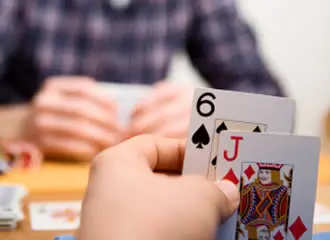

You're in a fairly big pot with an opponent, and after flopping a set on a Q104 board, you managed to river a boat with running deuces and are trying to extract value from your opponent. You fire out a half pot bet on the river, and your opponent hems and haws for a few seconds, then suddenly perks up. “I guess you flopped a set of fours, eh? It's the only thing that makes sense, the way you played the hand.” He turns over two kings and chucks them in the muck. “Nice hand, buddy.” You're happy to win the pot, but you wonder, “How did he know exactly what I had?” Hand reading is an integral skill to the professional poker player, and although it can be a tricky skill to master, there are ways to help accelerate the process and learn how to put players on ranges of hands first, then break it down from there.
It helps to first understand the type of player you're up against; is he pretty straight-forward, tricky, or wild and unpredictable? The more likely the play by the book, the easier it'll be to see patterns develop in his game. For example, imagine a tight player raises preflop from the cutoff, and you call with A4d on the button. The flop comes J72dd, and he leads out with a ¾ pot bet. You come along, and the turn is a queen. He slows down and checks, and you elect to take a free card. You peel an ace off on the river, but the straight-forward player chooses to fire another ¾ pot bet into you on the river. What gives?
The easiest answer? He very likely improved to two pair on the river with his AJ, and you need to release your pair quickly. A lot of players will ignore the evidence that they're beat on the river and pay this obvious value bet off, thinking, “Well, he bet on the flop and checked the turn, he must have a jack he's turning into a bluff, or maybe pocket kings; he shouldn't have an ace here, so I have to have the best hand!” Look at the facts; a tight, straight-forward player bet strongly at a innocuous flop, checked when a dangerous card hit the turn, then suddenly decided his hand was good enough to strongly bet again on the river; this is either AK or AJ a large percentage of the time, and you should almost always fold.
Let's look at an example from a trickier player, and see how someone willing to play more hands can widen a hand range and make it more difficult to put them on a hand. You open in middle position with two jacks, and get called by a tight, tricky, aggressive player in the big blind. You flop a wet 268dd board, and bet out after he checks. He tanks for a moment, then calls. The turn is a semi-brick deuce, and he again check/calls a half pot bet from you. The river is a black queen, bricking out both of the draws, and your opponent suddenly leads out for the full pot! An over to your jacks came out, but can your opponent actually have one? Or is he playing a more sinister hand, like 66 or AA? Let's look at the facts and break down some of the hands he should not be holding.
– The set/two-pair hands. On such a wet board, your flop bet can represent a lot of hands that a set doesn't want another card to peel off with; flush draws, 57s, 79s, and so on, and needs to not only protect his hand against these high equity draws, but build a big pot when you have the type of hand you do; a strong overpair.
– A deuce. This is another hand that really doesn't fit; when your trickier opponent hits the turn, you'd expect him to raise and, once again, protect/gain value with his disguised hand.
– Pocket pairs between 33-77. Two barrels into a pot should be more than enough to convince a tight player that you're holding something of interest.
So what could he possibly have here?
-A busted draw. This is initially what seems most likely, and many players will immediately jump on this conclusion. The flush and straight draws have little to no chance to win the hand, so the bail out bluff on the river is the only shot they have to salvage this pot. The problem? Your opponent is tight, meaning the straight draws are a little less likely that normal, so this is normally a busted flush draw, if it is a draw.
-A flush draw with a queen. This is the hand a lot of those same players forget to include; hands like AQ-Q9d that your opponent may have saw a flop with, then realized they had the best hand on the river and made a big value bet with.
-A pocket pair 99+/A8. Your opponent could very well have been sitting on a strong pocket pair himself, hoping to trap you post flop, then slowing down with his one pair hand, check/calling bets until the board looked safe enough to fire a big river value bet, queen be damned.
Notice, you're beating the bluffs and 99/TT, but losing to a fair chunk of hands as well! Given your opponent's tightness, you can probably tighten that range a bit more, based on your familiarity with him, but the key note I'd point out here is his lack of his normal aggression up until the river; if he had a hand he particularly liked, at any point in the hand, he would've likely raised. This is likely to either be a queen or a busted draw. You end up making the call, and he turns over AKd for air, netting you a big pot; but notice what happens if the river is an ace or king; you lose that same pot, and probably still pay off the bet!
All contents are ©
Bet365 Bonus Code, Sports, Casino and Poker Sign up offers and News
18+ Worried about your gambling?
Gamcare - When the fun stops – STOP!